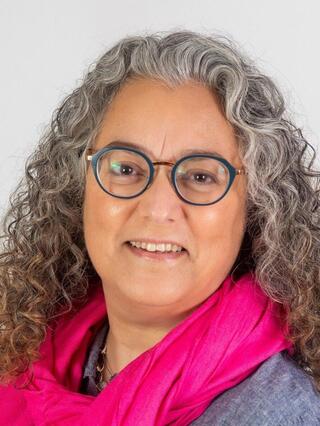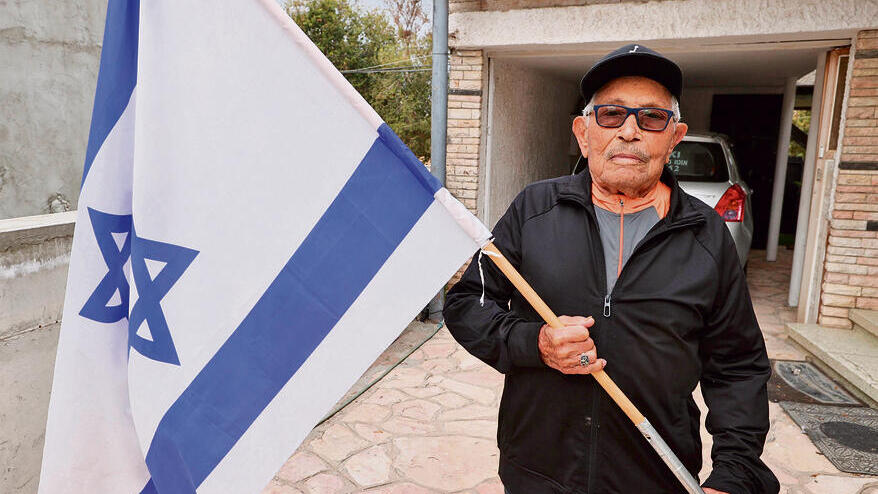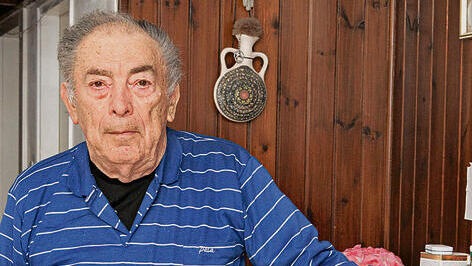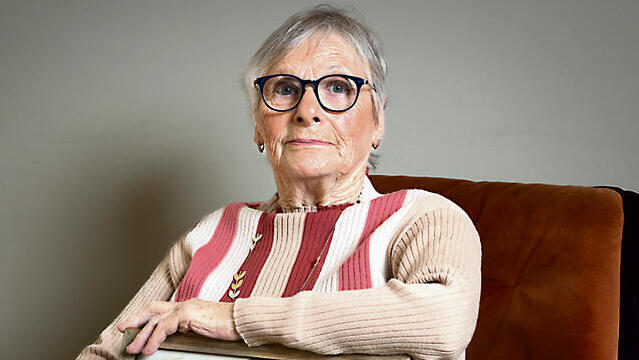Getting your Trinity Audio player ready...
They survived World War II, lost many family members, lived in inhumane conditions, fought, survived, and arrived in Israel bearing hope. Holocaust survivors never imagined that here, in the safe haven they’ve built themselves, they would witness scenes like those on October 7 or become refugees in their own land.
More stories:
Yeshayahu Foyer, a 91-year-old resident of Ashkelon, used to go swimming on the beach near his home at Ashkelon daily before leaving for his work in pest control. On October 7, a rocket hit his house, but he refused to leave Ashkelon throughout the entire war. "The mayor was here, and offered to relocate me wherever I wanted. I said I’m not leaving my home or my city," he says. "I am not abandoning my home no matter what. I’m not afraid."
'I'm the last refugee'
Foyer was a seven-year-old child in Galicia at the beginning of World War II. His mother sent him to one of the farms to hide, and his sister was sent elsewhere. Since the family members separated, he hasn’t reunited with any of them, and he doesn’t know their fate. He hid in the forest entirely on his own. Whenever the Nazi Germans approached, he moved from one hiding place to another.
After some time, he joined a group of partisans in the forest. He arrived in Israel in 1948 alone. He studied at the Hebron Yeshiva but later decided to enlist in the Golani Brigade, telling the yeshiva's head: "For 2,000 years, we waited to have an army, and now we have one. That's where I'm going."
During his military service, his friends from the forest in Poland arrived in Israel and established their homes in Ashkelon. "I had nowhere else to go, so they invited me to the city. They said that we would continue to be together in Ashkelon just as we were together in the forest. So, I agreed. This was back in 1953, and I've been here ever since."
He met his late wife Dina on one of Ashkelon’s beaches. The couple had two children, seven grandchildren, and 13 great-grandchildren. "I was in the Golani Brigade. I have a grandson who received an award from the IDF Chief of Staff. I have a granddaughter who was an educational officer. Another one was in the Air Defense Command. I’m the last refugee, the last survivor. They’re the next generation, our true victory."
His voice trembles while he talks about Hamas’ massacre, but it's important for him that people know he’s not losing hope. "I know all of the kibbutzim from the time I worked in pest control. We were slaughtered. We have a country now, and they told us it couldn't happen here. I can't understand it. Why is our blood expendable? Because we’re Jews?"
'The terrorists have no mercy for Holocaust survivors'
Aharon Kriotaro was born at the end of World War II, but despite his young age at the time, the memories that accompany him are very vivid. In the past few months since the war in Gaza began, he experienced childhood traumas and fears: "When I hear what happened there on television, it feels like overwhelming fear," he says.
Kriotaro was born in 1944 in the city of Iasi, Romania. "I was born in a dark and damp basement with no electricity. It was impossible to breathe there," he recounts. "We had no food. It was forbidden to speak, cry, or make noise. They would pinch me to make me quiet."
He made Aliyah to Israel in 1950 and arrived at Haifa. "We had nothing to eat in Israel as well. In the morning, they would give me a cup of milk and a piece of bread, and that had to last me until 5 p.m. Nevertheless, my father would tell me, 'Aharon, we came to Israel, and we’ll live here without worries or fear. We’ll build a new life.'"
In Israel, he met his wife, and the couple had three children, nine grandchildren, and two great-grandchildren. His trauma accompanied him throughout his life, but coping with it became more challenging since the war broke out. He recalls the sights and stories of the violence he experienced in Romania, the period when he had to hide and remain silent for long hours, witnessing torching, pogroms, and mass killings – extremely difficult scenes he hoped never to see again.
"The situation in the country takes me back," he says. "I can't leave the house. I added more locks to the door and closed-circuit televisions. I have terrible nightmares and struggle to sleep. I'm afraid to be alone. I saw the terrorists have no mercy, even toward the elderly and Holocaust survivors."
'I won't agree to become a refugee again'
Miriam Beit-Talmai Shapiro, 88, who escaped Nazi Germany after Kristallnacht at the age of three and a half and became a refugee in England, became a refugee for the second time during the war. Miriam was forced to leave her home in Kibbutz Zikim on October 7 and hasn’t returned since.
"Over three months ago, I stood in front of my house’s door, an 88-year-old woman with a suitcase in hand. Suddenly, I saw myself as that three-year-old little girl, forced to flee the Germans after Kristallnacht. On October 7, I was confined in a protected room for hours. I wasn't afraid. I don't know what fear is. I'm already used to it. But these days are very difficult."
Miriam, a widow, mother to three daughters, grandmother to six grandchildren, and great-grandmother to two great-grandchildren, currently stays in a hotel in central Israel and longs to return back home.
"I was a refugee throughout my childhood – I won't agree to become a refugee again in my own homeland," she says. "Let them take – with my home. I hope we can return soon. The house was not damaged, and even the tree I planted in the yard two weeks before the war survived. I’ll survive as well."
 Ety FarhiPhoto: Niri Gatmon
Ety FarhiPhoto: Niri GatmonEty Farhi, CEO of the Foundation for the Welfare of Holocaust Victims, said: "Since October 7, we have seen that some Holocaust survivors are reliving their trauma after experiencing horrors they thought they would never see again. The International Holocaust Remembrance Day allows the world to hold onto the memory of the Holocaust and remind us of our critical mission – to allow Holocaust survivors to age with dignity."





